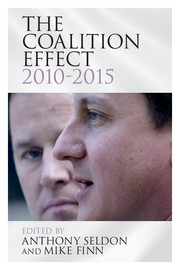Book contents
- Frontmatter
- Contents
- Contributors
- Acknowledgements
- David Cameron as Prime Minister, 2010–2015: The verdict of history
- Part I The coalition and the government of Britain
- Part II The coalition and policy
- 6 The coalition and the economy
- 7 The coalition and energy policy
- 8 The coalition and infrastructure
- 9 The coalition and society (I): Home affairs and local government
- 10 The coalition and society (II): Education
- 11 The coalition and society (III): Health and long-term care
- 12 The coalition and society (IV): Welfare
- 13 The coalition and foreign affairs
- 14 Europe: The coalition's poisoned chalice
- 15 ‘What the coalition did for women’: A new gender consensus, coalition division and gendered austerity
- 16 The coalition and culture: ‘Bread, circuses and Britishness’
- Part III The coalition and political culture
- Part IV Conclusion
- Index
7 - The coalition and energy policy
Published online by Cambridge University Press: 05 April 2015
- Frontmatter
- Contents
- Contributors
- Acknowledgements
- David Cameron as Prime Minister, 2010–2015: The verdict of history
- Part I The coalition and the government of Britain
- Part II The coalition and policy
- 6 The coalition and the economy
- 7 The coalition and energy policy
- 8 The coalition and infrastructure
- 9 The coalition and society (I): Home affairs and local government
- 10 The coalition and society (II): Education
- 11 The coalition and society (III): Health and long-term care
- 12 The coalition and society (IV): Welfare
- 13 The coalition and foreign affairs
- 14 Europe: The coalition's poisoned chalice
- 15 ‘What the coalition did for women’: A new gender consensus, coalition division and gendered austerity
- 16 The coalition and culture: ‘Bread, circuses and Britishness’
- Part III The coalition and political culture
- Part IV Conclusion
- Index
Summary
The coalition came to power with a ready-made energy policy developed under Labour. The Secretary of State was Ed Miliband, and his policy as it played out under the coalition was to prove the basis of a return to a level of state intervention not seen since the days of the CEGB, British Gas and the nationalized industries. By the general election in 2015, an almost complete U-turn had been performed, abandoning most of the liberalized and competitive structures that had been the hallmark of British energy policy for a quarter of a century.
How did a Conservative-dominated government come to preside over such a profound reversal to their policy heritage from the Thatcherite years? Why did they allow this to happen? The answers lie in the path dependency which Labour had created towards ever-greater intervention and the ceding by the Conservatives of energy policy to the Liberal Democrats as part of the price of coalition. It was something the Conservatives would come to regret, forcing the Chancellor and his allies to fight a rearguard action. Worse still, the coalition was to preside over a big increase in the coal burn, a rise in carbon dioxide emissions in 2013, a political rebellion on prices, and come perilously close to provoking a security of supply crisis. No one could describe coalition energy policy as a success.
The Labour legacy
Labour in government had agonized over energy policy. Having reviewed regulation following the 1997 election, there were major energy policy reviews after both the 2001 and the 2005 general elections. The 2001 policy review came after the Royal Commission on Environmental Pollution (RCEP) had recommended a 60 per cent cut in emissions over the next fifty years. The 2005 review was a battle as much about the role of nuclear (which Blair favoured) and finding a way back for coal on security of supply grounds as it was about climate change.
- Type
- Chapter
- Information
- The Coalition Effect, 2010–2015 , pp. 194 - 208Publisher: Cambridge University PressPrint publication year: 2015



